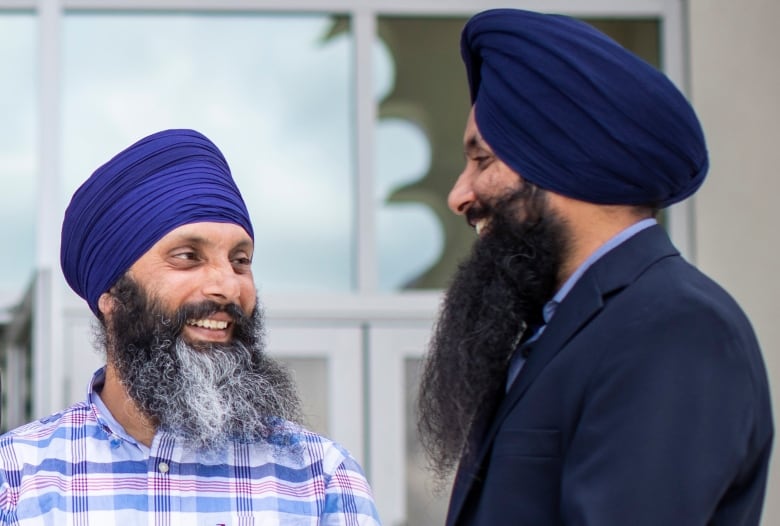Dozens of Sikh activists rallied outside the Sheraton Guildford Hotel in Surrey, B.C., on Friday evening to protest the presence of an Indian diplomat in the city.
Sanjay Kumar Verma, India’s High Commissioner to Canada, attended a trade forum hosted by the Surrey Board of Trade (SBOT) as the event’s keynote speaker, drawing outrage from advocates for the establishment of an independent Sikh homeland in northern India, called Khalistan.
More than 60 demonstrators gathered outside the hotel, waving yellow Khalistan flags and chanting slogans decrying the Indian diplomat’s attendance.
Some said extending Verma an invitation was a slap in the face of the Sikh community.
“Normalizing relationship with India with the High Commission without any form of evidence or equity and justice towards Sikh community is impossible to have,” Akashdeep Singh with Khalistan Centre told CBC News.
On The Coast10:04Protest in Surrey precedes High Commissioner of India to Canada speaking event
The CBC’s Sohrab Sandhu reports from the Sheraton Guildford hotel, where a protest was planned before the High Commissioner of India to Canada is scheduled to speak. Manimugdha Sharma, a PhD student in UBC’s history department, put today conflict in context.
Anita Huberman, president and CEO of the SBOT, said she received a number of messages asking her to call off the event “but the event is only focused on economic opportunities,” she told CBC News.
“We are hosting to ensure that we are still focused on trade opportunities between Canadian and India businesses.”
Huberman said the event was intended to delve into opportunities for more economic engagement between India and Canada. During the event, Verma talked about the importance of trade ties between the two countries.
India is B.C.’s fifth largest trade partner, according to statistics from the B.C. government. In 2022, Canada imported and exported a record number of goods and services between the two countries worth nearly $20 billion.
Singh, however, expressed frustration over that decision.
“How much do we value economic relations over the actual life and well-being of the Sikhs?” he said. “India is not welcome here.”
The demonstration is the latest in a string of protests carried out by Khalistan supporters across Canada since the killing of Hardeep Singh Nijjar, a Sikh leader, pro-Khalistan activist and Canadian citizen, in June last year.

Pro-Khalistan activists have long alleged the Indian government’s involvement in the death of the Sikh leader. Prime Minister Justin Trudeau has also publicly implicated India’s government in Nijjar’s killing.
In an interview with CBC News after the event, Verma said he would like to urge protesters to voice their concerns “with civility.”
“I would say don’t disrupt the [India-Canada] relationship. It’s too large a relationship to be disrupted,” he told CBC.
On The Coast7:48Surrey businesses worry about rising tensions between Canada and India
Surrey Board of Trade CEO Anita Huberman speaks with Dan Burritt about how the dispute over the killing of Hardeep Singh Nijjar is impacting global trade.
Manimugdha Sharma, a PhD student in UBC’s history department, says Nijjar’s killing has created a lot of tension between pro-Khalistan activists and the Indian government.
“Both Canada and India have been trying to normalize their relationship. But the protests like this, they create more anxiety for the Indian side [when it comes to India’s relations with Canada],” he said in an interview with CBC’s On The Coast.
“[The Khalistan supporters] have [carried out] several such protests, not just in Canada, but also in the United States, in the U.K., in Australia as well.”
Sharma says the movement is not strong in India, however.
“They [the pro-Khalistan supporters] certainly try to give an impression that this agitation has popular support,” he said. “It has very little support, if at all, in India.”



